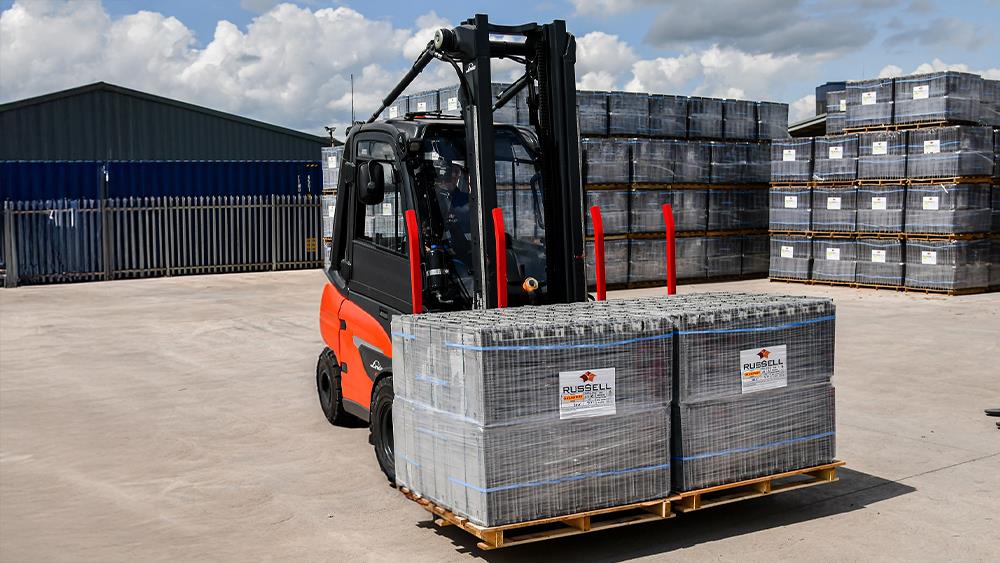

As the construction industry continues to grapple with the carbon reduction targets outlined in the Government’s Construction 2025 Strategy, roof systems manufacturer Russell Roof Tiles says it remains a pioneer with continued innovation in this arena.
The strategy, published in 2013 to align with the UK’s broader Net Zero ambitions, calls for a 50% reduction in greenhouse gas emissions across the built environment by 2025. Now, as the deadline looms, the construction sector is still facing significant obstacles in meeting this target, from the use of high-emission materials to a lack of carbon transparency from manufacturers.
Russell Roof Tiles feels it has a responsibility to support the wider building industry in its efforts to reduce carbon output, and announced its Net Zero 2040 target in 2022; a decade ahead of the UK.
Since then, Russell Roof Tiles has made huge strides in reducing its environmental impact, remaining ahead of schedule on the road to Net Zero for the third year running. Its most recent carbon reduction report showed that in 2024 its emissions were 6.7% below target, with the firm emitting 2,476.50 tonnes of CO2, compared to the projected 2,655.27 tonnes.
Daniel Hancox, Corporate Sustainability and Development Director, commented: “We pride ourselves in our philosophy of reducing our carbon footprint, and after verifying the data, we are pleased to report that we remain well ahead of our reduction target.
"Since we began tracking our output in 2021, we have achieved an overall 13.6% decrease in carbon emissions, thanks to major investments and ongoing upgrades across our three sites in Burton and Lochmaben.
“With a firm goal of reaching Net Zero by 2040, we are embedding sustainability throughout every department to further benefit and offer transparency to our customers, and are exploring ways to engage our entire supply chain in the journey.”
Russell Roof Tiles attributes its success on the road to Net Zero to site upgrades and product development. Most recently, the manufacturer extended its electric vehicle fleet with the acquisition of three Lansing Linde electric forklift trucks. Three years after first investing in electric forklifts, as part of its sustainability efforts, this brings the manufacturer’s fleet to 12 in total, replacing old diesel forklift trucks to cut emissions and boost efficiency.
This vehicle upgrade follows the installation of solar panels at the company's new £18.5 million upgraded plant in Burton. The facility is the manufacturer’s largest investment to date, and across the whole operation Russell Roof Tiles is reducing its environmental impact through energy-efficient equipment and sustainable materials, while streamlining production to keep pace with customer needs. The firm is already recruiting for new operatives for the Burton site as it boosts manufacturing output in response to demand for its products.
The installation of 165kW of solar panels and four Solis inverters in late 2024 is helping to power the production facility as work continues on-site, and has generated over 20,000kWh of clean electricity for the factory, saving approximately 21.6 tonnes of CO2 emissions, and immediately offsetting energy costs.
Andrew Hayward, Managing Director at Russell Roof Tiles, said: “Another year of outstanding results highlights the powerful impact of our continued efforts to reduce our carbon emissions. We’re focusing not just on our manufacturing impact but also on the influence of our products, which is why we are pleased to be bringing innovations, like our Bute3® triple interlocking multipurpose roof tile, to the market. With a 20% more efficient production process and 40% fewer deliveries required to site, we’re significantly reducing the environmental impact of our products.”
The manufacturer has been working with external accreditation agency Planet Mark to verify and measure its carbon and social data since the announcement of its Net Zero 2040 target three years ago. This external certification assures customers that the business is taking active steps to tackle climate change and reduce carbon emissions in the supply chain. The manufacturer places a major focus on direct emissions (Scope 1 & 2) through projects such as fossil fuel reduction, energy efficiency, maximising renewables and procuring green energy.